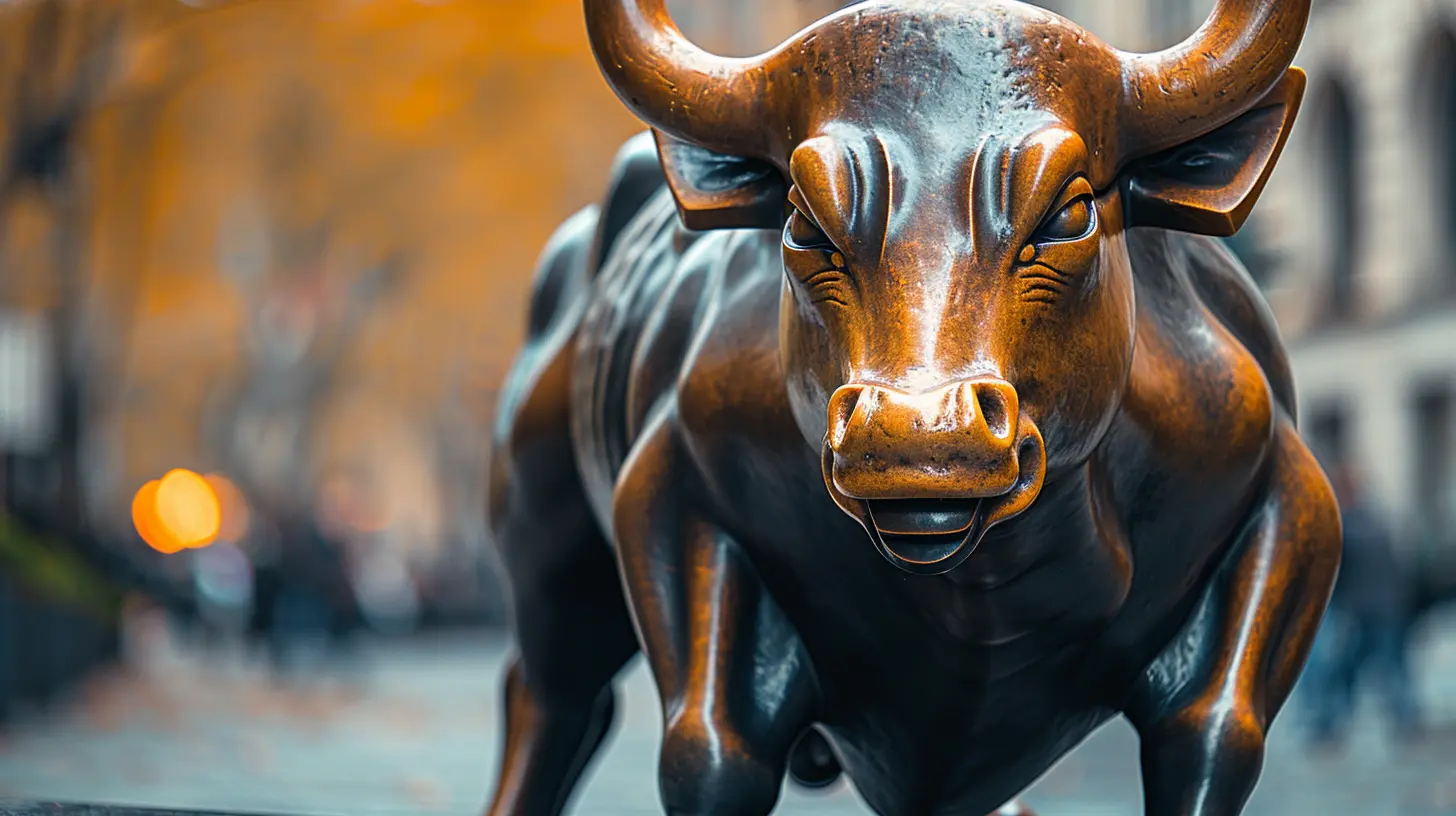Speculative Stocks: A Deep Dive into Unpredictable Markets
21 September 2025
So, you’re curious about speculative stocks, huh? Well, buckle up, because we’re about to take a rollercoaster ride through the thrilling, chaotic, sometimes gut-wrenching world of unpredictable markets. Whether you're hoping to catch the next Tesla before it zooms to Mars or you’re just tired of hearing your cousin brag about his “moonshot” portfolio, you’ve come to the right place.
This isn’t your typical Wall Street suit-and-tie lecture — nope, we’re going full-on conversational mode here. Think of this as sitting at a café with a financially nerdy friend who speaks your language. Sound good? Great. Let’s dive in.
🧐 So, What Are Speculative Stocks Anyway?
Let’s not overcomplicate things.Speculative stocks are kind of like the bad boys of the stock market — high risk, potentially high reward. They’re the stocks that don’t have solid earnings (yet), maybe not even profits (gasp!), and they’re often driven by hype, hope, and headlines.
These are the companies that could either revolutionize their industry… or be a tiny footnote in financial history books.
Think biotech firms working on the "next big cure," penny stocks with wild dreams, or tech startups with no profits but massive buzz.
In short — speculative stocks are bets. Not blind bets (hopefully), but bets nonetheless.
🎰 Speculative vs. Traditional Stocks: The Showdown
Let’s paint a picture.Imagine you're at a casino. On one side, you've got some slow, steady slot machines (that’s your traditional stocks — think Coca-Cola, Apple, Johnson & Johnson). They give you a small chance of winning big, but hey, at least you're not likely to lose everything in one spin.
Then, there’s the guy at the poker table going all-in on every hand — that right there is your speculative investor. He might walk away a millionaire… or broke.
Here’s a breakdown:
| Feature | Traditional Stocks | Speculative Stocks |
|--------|--------------------|--------------------|
| Risk | Low to moderate | High |
| Returns | Steady growth | Potential moonshot or total wipeout |
| Fundamentals | Strong revenue & profits | Often none (yet) |
| Volatility | Mild to moderate | Wild and unpredictable |
| Time Horizon | Long-term investment | Short to medium-term gamble |
🧠 But Why Would Anyone Invest in These?
Fair question!Let’s be real: speculative stocks are not for the faint of heart. But they do have their appeal. Want to know why investors chase them like seagulls after a french fry? Here’s the scoop:
1. 🚀 Massive Upside Potential
We’re talking potential 10x, 20x, or even 100x returns. Just imagine buying Amazon in the 1990s or Bitcoin at $5. Sure, they were speculative back then — but look at them now.2. 🌱 Opportunity to Get in Early
Speculative investing gives you a chance to jump in at the ground floor. If you truly believe in a company’s vision, you might see immense returns if you're early and right.3. 📈 Exciting and Engaging
Let's face it — watching a blue-chip inch up 0.2% a day is like watching paint dry. Speculative investing? It’s like watching fireworks. You’re constantly checking charts, reading news, and riding emotional highs (and lows).
⚠️ Risks, Pitfalls, and Reality Checks
Okay, dream over for a second. Time to get serious.While speculative stocks can deliver mind-boggling returns, they can just as often obliterate your portfolio if you aren't careful.
1. 💸 You Could Lose Everything
Yep, you read that right. These companies often burn through cash, pile up debt, or get crushed by competitors. If they fail — and many do — your investment could go poof.2. 🧾 Lack of Financial Transparency
Speculative companies might not have a proven track record. Some might not even have revenue, which means you’re betting on future potential, not current performance.3. 🙈 Market Manipulation
Ever hear of the “pump and dump”? It’s when market manipulators inflate a stock’s price by hype, only to bail at the peak and leave newbie investors holding the bag. Not fun.🧭 How to Identify a Speculative Stock (Without Blindly Guessing)
So how do you spot one? Here are some telltale signs that you're dealing with a speculative play:- The company has little to no profits (sometimes zero revenue).
- It operates in emerging or unproven sectors (think space tech, AI, biotech).
- There’s more news hype than actual progress.
- Analysts give giant price target ranges (like from $2 to $50 — seriously?).
- Volatility is off the charts (double-digit swings in a day are common).
Here’s a pro tip: check the company’s fundamentals, but also try to understand why it’s speculative. Is it new to the market? Facing regulatory hurdles? Short on cash? These red flags can help you decide if the risk is worth the reward.
🛠️ Strategies to Survive (and Maybe Even Thrive)
Before you mortgage the dog to invest in a flying car startup, take a breath. Here’s how to play the speculative game smartly:1. 📌 Limit Your Exposure
Don't go all-in. Maybe 5–10% of your portfolio, tops. Think of speculative stocks like hot sauce — a little adds flavor, too much and you’re crying.2. 🧪 Do Your Homework
Just because people are raving about a stock on Reddit doesn't mean it's solid. Read SEC filings, understand the business model, know who's behind the company, and follow the news cycle.3. ⏰ Set Your Exit Plan
This is crucial. Decide in advance — are you holding long term, or are you riding the wave and jumping off once it hits a certain price? Emotional investing is a killer in the speculative world.4. 🔔 Use Stop-Loss Orders
Nobody likes to lose money, but in speculative investing, you need to know when to cut your losses. A stop-loss order can prevent a small dip from becoming a total disaster.🔥 Famous Speculative Success Stories
Let’s lighten the mood with some legendary wins. These companies were once considered speculative — now they’re stock market legends.1. Amazon (AMZN)
Back in the ’90s, it was “just” an online bookstore. People laughed. Fast forward, and Amazon rules retail, tech, and your smart speaker.2. Tesla (TSLA)
“Electric cars? LOL.” That was the general sentiment when Elon Musk started out. Investors who believed early? Laughing all the way to the bank.3. Netflix (NFLX)
Mail-order DVDs sounded wild at the time. Now it’s a streaming giant that changed how the world watches TV.Moral of the story? Sometimes speculation pays off big time — but spotting that diamond in the rough is no easy feat.
💔 The Not-So-Happy Endings: Speculative Flops
Of course, for every Tesla, there’s a Theranos. Here are some cautionary tales:1. Nikola (NKLA)
Once hailed as a Tesla rival, Nikola made bold claims — but lacked substance. Turns out, rolling a truck downhill isn’t the same as engineering innovation.2. Blockbuster (Yes, That Blockbuster)
Ignored Netflix’s rise, failed to innovate, and filed for bankruptcy. A powerful reminder that even giants fall when they get too comfortable.3. Quibi
A streaming app backed by serious Hollywood money. It aimed for short videos on mobile. It tanked in under a year. Ouch.🧮 Should YOU Invest in Speculative Stocks?
Let’s be honest – speculative investing isn’t for everyone.If the idea of your portfolio swinging 20% in a day makes your palms sweat, maybe stick to safer ground. But if you like a little risk, have a high tolerance, and a long-term mindset — speculative stocks can be a thrilling (and sometimes profitable) ride.
Just remember: never risk what you can’t afford to lose.
It’s not gambling… if you do it right.
🎯 A Final Word: Risk Smart, Not Hard
Speculative stocks are like a spicy taco — thrilling, intense, and not for the faint of heart. They can spice up your portfolio, offer juicy returns, and turn small bets into big wins.But like any spicy dish, they can also burn you if you go overboard.
Keep your strategy smart, your eyes open, and your expectations realistic. That way, whether your “moonshot” hits or misses, you stay grounded and financially secure.
So go ahead — take the plunge into speculative waters — just don’t forget your life jacket.
all images in this post were generated using AI tools
Category:
Speculative InvestingAuthor:

Harlan Wallace
Discussion
rate this article
1 comments
Amy Newton
Great insights on speculative stocks! Your analysis helps demystify unpredictable markets, empowering readers to make informed investment decisions. Keep up the excellent work!
October 13, 2025 at 2:29 AM

Harlan Wallace
Thank you for your kind words! I'm glad you found the insights helpful. Your support means a lot!


